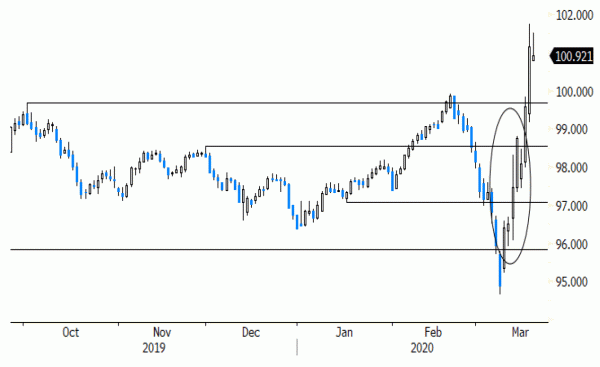- Rates: ECB launches brand new PEPP
The ECB announced a new €750 bn Pandemic Emergency Purchasing Programme (PEPP) in its latest attempt to help counter the coronavirus impact. We think it might sooth investors in daily perspective (declining core and peripheral bond yields) but are cautious about the longer-lasting impact as the fundamental credit risk assessment is likely to continue. - Currencies: Hunt for USD liquidity prevails
The dollar bid remained the most important FX driver yesterday and that is likely going to be the case in the near term. The ECB’s exceptional move might limit EMU spread widening and thus downward pressure on the euro only temporarily. EUR/GBP tested crisis highs as investors keep shunning the lesser liquid currencies.
The Sunrise Headlines
- US stocks plummeted, reaching their lowest level in 3 yrs as investors fear the economic damage from the coronavirus pandemic. The Dow Jones unperformed (-6.30%). Asian markets follow suit with losses up to 9% (South Korea).
- The Fed took another page out of its 2008 crisis-era playbook, initiating a program to create a backstop for prime money market mutual funds as alarm over the coronavirus pandemic continues to cause money market stress.
- The RBA slashed its policy rate by 25 bps to an all-time low of 0.25% and made a foray into QE for the first time with no limits on the scope/size of the bond-buying programme while also voicing readiness to intervene in FX markets.
- The ECB launched an additional emergency bond-buying programme worth €750 bn that will continue through at least the end of the year as “extraordinary times require extraordinary action”, ECB president Lagarde commented.
- USTS Mnuchin outlined a $1.3 tn rescue plan with the centrepiece being $500 bn in direct payments to Americans as of April 6. It would also include $50 bn in loans to airlines and funnel cash to businesses to help keep workers on payroll.
- Indian state banks are selling dollars in a bid to ease the rupee’s drop as the currency slid to a record low past USD/INR 75 amid a global rout in risk assets.
- The NYSE will temporarily close its trading floor starting Monday and move to fully electronic trading after two people tested positive for the coronavirus.
- Today’s economic calendar contains US jobless claims and the Philly Fed Business Outlook Survey which is expected to settle back significantly in March following the COVID-19 outbreak. Spain, France & the UK tap the bond market
Currencies: Hunt For USD Liquidity Prevails
Hunt for USD liquidity prevails
Yesterday, the safe haven bid for the dollar continued unabatedly. The trade-weighted dollar (DXY close north of 101) jumped to the highest level since Spring of 2017. The hunt for USD liquidity remains the sole driver for trading. Interest rate differentials or other economic considerations have no (lasting) impact on the FX trading dynamics. EUR/USD slipped (temporarily?) below the 1.09 big figure (close 1.0915). USD/JPY also trended north for most of the day (close 108.08). Smaller, less liquid currencies were often captured in an uncontrolled freefall, irrespective of the underlying eco fundamentals.
Overnight, after an interim emergency meeting, the ECB raised the amount of its APP by €750 bn toward the end of the year. EUR/USD temporarily gained a few ticks after the ECB announcement, but for now it doesn’t look like a game-changer for (global) FX trading. After trading relatively stable early this week, the yuan also lost ground against the dollar (USD/CNY 7.07 area), but the loss is orderly compared to other regional currencies and the yuan continues appreciating on a trade-weighted basis. Other regional currencies remain under heavy pressure. Some authorities are considering FX interventions or are rumoured to do so (RBI). The Reserve bank of Australia cut its policy rate further to 0.25% and moved to QE. RBA’s Lowe said the RBA isn’t intervening in the FX market yet, but that it is prepared to do so if needed.
At the start of trading this morning, there is no obvious trigger available to expect the pattern of global FX trading to be materially different from yesterday. The ECB action might take some pressure away from the intra-EMU bond markets, limiting the widening of spreads. This was an additional euro negative yesterday. However, as long investors don’t get a clear view on how individual measures from monetary and fiscal authorities will address the impact of the corona virus, the extreme risk-off attitude will probably continue to favour the dollar. Investors will look out for any coordinated action at a global (G7/G20) level.
Yesterday, sterling couldn’t decouple from the global sell-off of smaller, less liquid currencies. Maybe the UK is also seen as a bit lagging in addressing the impact of the corona virus. EUR/GBP surpassed the top set after the Brexit referendum. For now, there is no reason to expect sterling to escape from the global rush more liquid assets/currencies.
USD trade-weighted (DXY): USD preference persists

